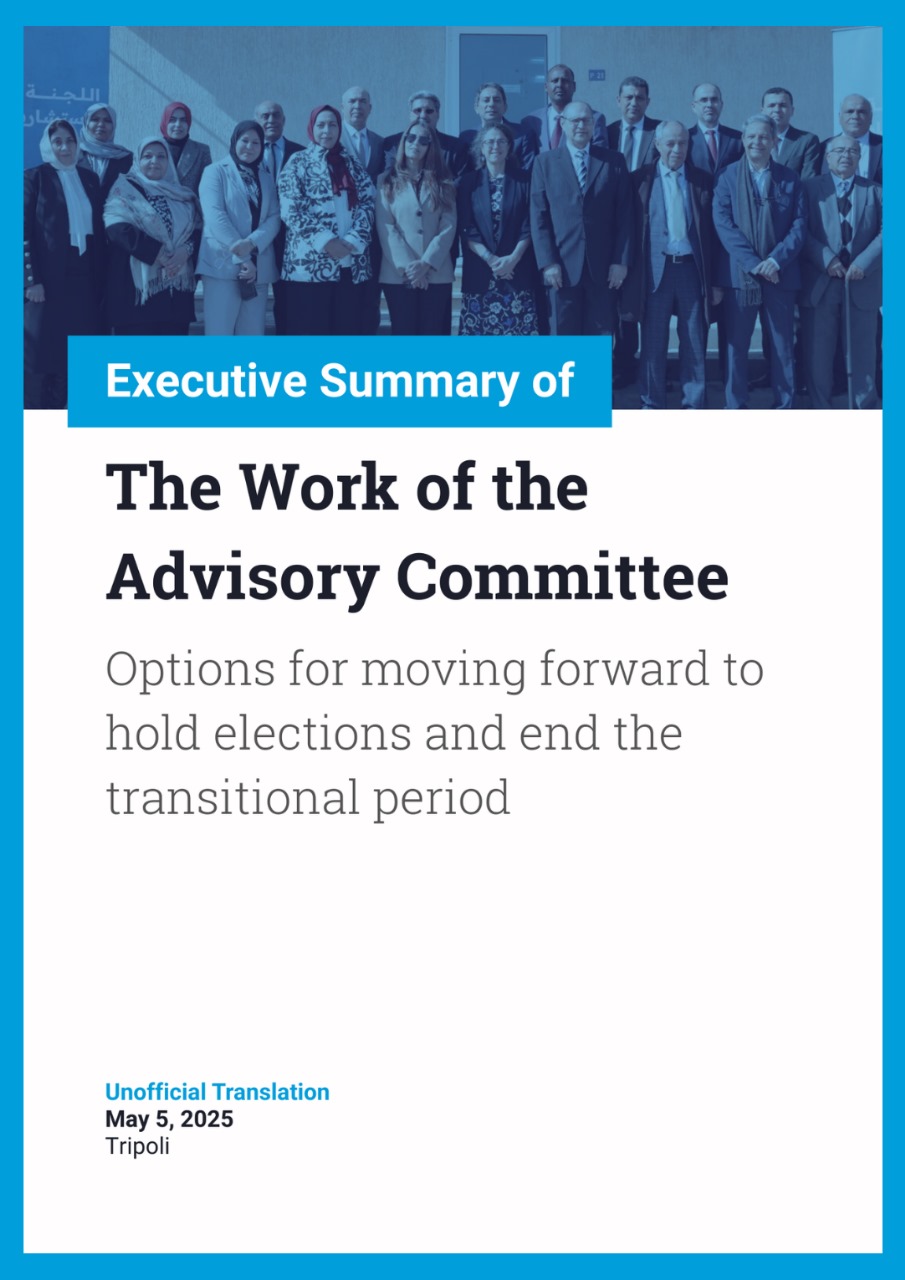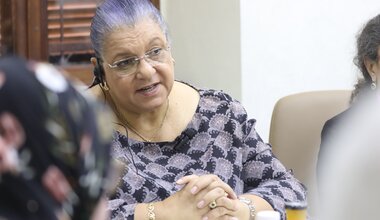Martin Kobler, Special Representative of the Secretary-General and Head of UNSMIL Briefing to the UN Security Council
“Setting the Stage for Peace”
7 June 2017, Tunis
Thank you, Mr. President.
First of all, I would like to wish all who observe the holy month of Ramadan, I would like to wish peace, harmony, and serenity.
Señor Presidente, distinguidos miembros del Consejo,
Quisiera también felicitar a Bolivia por presidir el Consejo de Seguridad este mes.
Estoy aquí hoy para actualizar al Consejo sobre los últimos desarrollos en Libia. Hoy, me gustaría tomar un momento para reflexionar sobre el pasado antes de establecer nuestras prioridades para el futuro.
Mr. President,
When I came to Libya in November 2015, I continued the work of my predecessor, Bernardino León, who had patiently forged a political agreement after a year of diplomacy.
As mediators will know, concluding an agreement is one thing, implementing an accord is another.
In Libya, the transition process has not been fully implemented. Parallel institutions continue to exist. The House of Representatives did not yet recognize the Government of National Accord nor did it adopt the Constitutional amendment.
That said, the Libyan Political Agreement however, has changed the facts on the ground.
The Presidency Council has been working in Tripoli since 2016. Libyan oil production has exceeded 800,000 barrel per day, from 200,000 bpd few months ago. Da’esh, while still a threat, is a shadow of what it was just one year ago.
Most importantly, whether you are a Libyan from Benghazi, Tripoli or Sabha, the Agreement remains the greatest hope for a solution to the crisis in Libya.
The people of Libya desire peace;
They desire security;
They desire a country where their children have a brighter future.
Mr. President,
In my last statement, I laid out several priorities that must still be addressed. Where we stand on the most important issues today?
First: There is consensus that the LPA remains the framework of the political process
Despite criticism, there is overwhelming national and international support for the Libyan Political Agreement.
This Agreement, however, is not set in stone.
After months of consultations with Libyan, regional and international stakeholders, we are developing a roadmap to allow limited amendments to the Libyan Political Agreement, through an inclusive Libyan-led and Libyan-owned process.
I see broad agreement on the areas where amendments are still needed. There are still different ideas on the format of the talks.
However, there is an agreement on the principles guiding the future talks.
My advice to the international community is to provide the necessary assurances and guarantees to implement what Libyans will agree upon. They cannot do this alone without the support of the international community. They need your strong and unified support.
Second: The military situation
The adversities of a political solution seek to use violence to undermine efforts to reach a settlement.
The attack on the Brak al Shati airbase on 18 May is an
example. Radical elements, including some affiliated with Al-Qaeda, massacred dozens of people.
This inhuman act not only demonstrated complete disregard for human life but also was a deliberate attempt to undermine the political process.
Unfortunately, the closer a settlement is, the higher the threat of such violence.
More of the same was seen few days ago when forces affiliated with the so-called Salvation Government attacked in Tripoli at the end of May.
Fortunately, forces supporting the Presidency Council successfully defended the city and now control the capital.
Third: The urgent need to unify the Libyan security apparatus
Yesterday, on June 6, I once more met with Field Marshal Haftar in Benghazi. He assured me he wants to proceed on the basis of the Libyan Political Agreement, supporting a political process to amend the Agreement.
I encouraged him to let politics prevail and not to pursue military confrontation.
We agreed that a united Libyan security apparatus is vital for peace and prosperity. I recommended to Field Marshal Haftar that officers from all parts of the country should meet to discuss military matters. We stand ready to facilitate such a meeting, as we have done before.
In Tripoli, the Security Plan must now be extended to the entire city. The state authority has to be expanded; the authority of the Presidency Council over armed groups has to be strengthened. These forces must be consolidated within the relevant ministries. Command and control must be unified.
The unification of the security apparatus must also occur on a national level.
In line with the guidance of Secretary General Guterres on prevention of conflicts, we do our utmost to ensure dialogue prevails over confrontation, Unity prevails over division, and security prevails over chaos.
Continued use of the military to achieve political goals will only harden positions.
Instead, a political solution, including agreement on a civilian authority to command the security apparatus, is needed.
Fourth: Weaknesses in the economy and financial situation need to be addressed.
Despite the increase in oil revenue and the ability of the Presidency Council to agree on a new budget for 2017, the fundamentals of the Libyan economy remain flawed.
The division of financial institutions, instability and low confidence in the banking sector continue to feed inflation and the lack of liquidity. The Central Bank has to decisively address the fiscal and monetary problems of Libya.
Libya is still spending beyond its means and its foreign currency reserve is shrinking constantly.
The dire economic situation and the explosion of the black market is feeding criminality and violence. It must be addressed if Libya is to pull itself out of its downward spiral.
Fifth: National reconciliation is vital for establishing a durable peace in Libya.
In this regard, I welcome the steps by the Presidency Council toward establishing a national reconciliation commission and beginning official consultations.
In any reconciliation effort, the role of youth and women will be crucial. I am awed by the energy and optimism of Libyan youth. During the youth conference convened by UNSMIL in May, numerous initiatives were proposed and linkages formed. These efforts must and will be supported.
Sixth: Many Libyans call for stronger involvement of the international community.
I would like to recognize the contributions made by the neighbouring states. As elsewhere, it is the neighbours, which first feel the consequences, and it is they, who are part of the solution.
On 8 May I attended the 11th Neighbouring States meeting in Algiers and am encouraged by the efforts of this forum to find a common position and solution.
Yesterday, the meeting in Algiers between the three states, Egypt, Algeria and Tunisia concluded with a declaration and also expressed support to UN efforts and the coherence of the international community.
With regards to politics, both the regional and international community must come together to support the Libyan peace process. Not interfering, but in the spirit of partnership, respect the sovereignty of Libyan and international law.
The second meeting of the Quartet in Brussels on 23 May is an increasingly important forum to harmonize the positions of regional and international organizations, the African Union, the Europeans Union, the League of Arab States and the United Nations.
The AU also sent two delegations to Libya including its High Representative and a ministerial delegation of the AU High Committee on Libya.
This collaborative approach where all initiatives work in a complementary manner to advance the UN-facilitated political process is very much needed.
Uncoordinated or parallel efforts risk undermining progress and complicating an already complex situation.
Mr. President,
We must move forward in supporting Libyan-led effort to find a durable solution. Without progress in politics, the symptoms of the conflict will only worsen.
Migrants continue to die as they seek a better life. Women and men in detention facilities and prisons live a nightmare.
Basic humanitarian principles and humanitarian space are under threat. Five hospitals have been bombed this year and humanitarian supplies cannot reach many regions in Libya due to insecurity.
The human rights situation remains of deep concern. Since March, 65 civilians were killed during armed conflict, some by indiscriminate bombing.
We cannot become numb to the suffering this conflict is causing;
We cannot compromise the basic principles that unite us, that make us human;
Nor can we afford to abandon our hopes and our desire for a better, more united Libya.
Mr. President,
Distinguished Members of the Council,
Finally, I would like to thank all the men and women of UNSMIL and the UN family. I admire your dedication I see in all of you - engineers, analysts, administrators alike. I know your work is often unrecognized. I would therefore like to take this opportunity to recognize you and salute your efforts.
My last message today goes to the people of Libya. I reflect upon the words of Libyan author Hashim Matar:
“Dreams have consequences. There is no turning back. A revolution is not a painless march to the gates of freedom and justice. It is a struggle between rage and hope, between the temptation to destroy and the desire to build."
Women and men of Libya, I am sure of one thing. You will succeed in building a nation, you and your children will be proud of.
Your sacrifices have been too deep for anything less.
Your communities are too strong to collapse.
Your hearts are too full of courage to fail.
Thank you.
 United Nations Peacekeeping
United Nations Peacekeeping UN
UN








